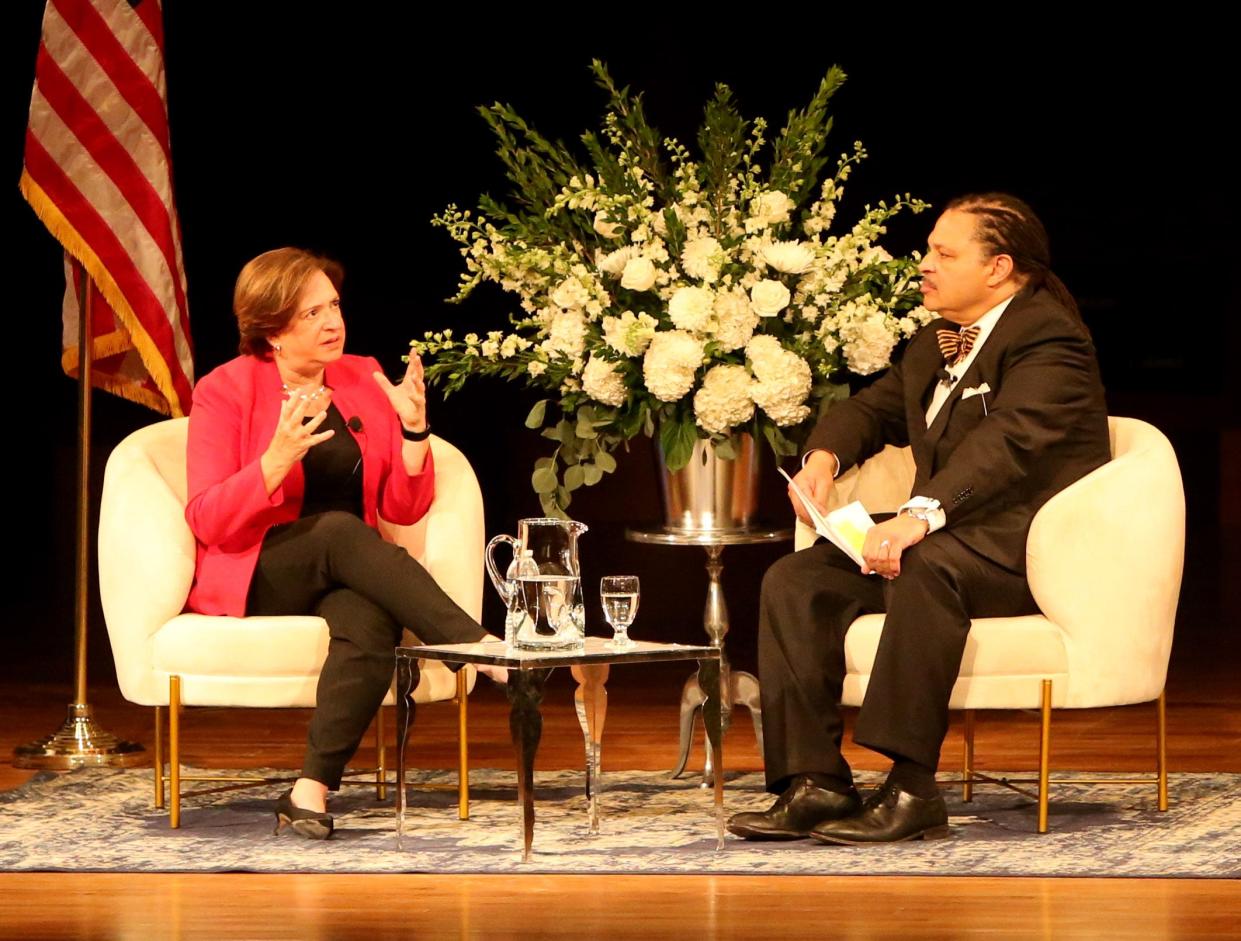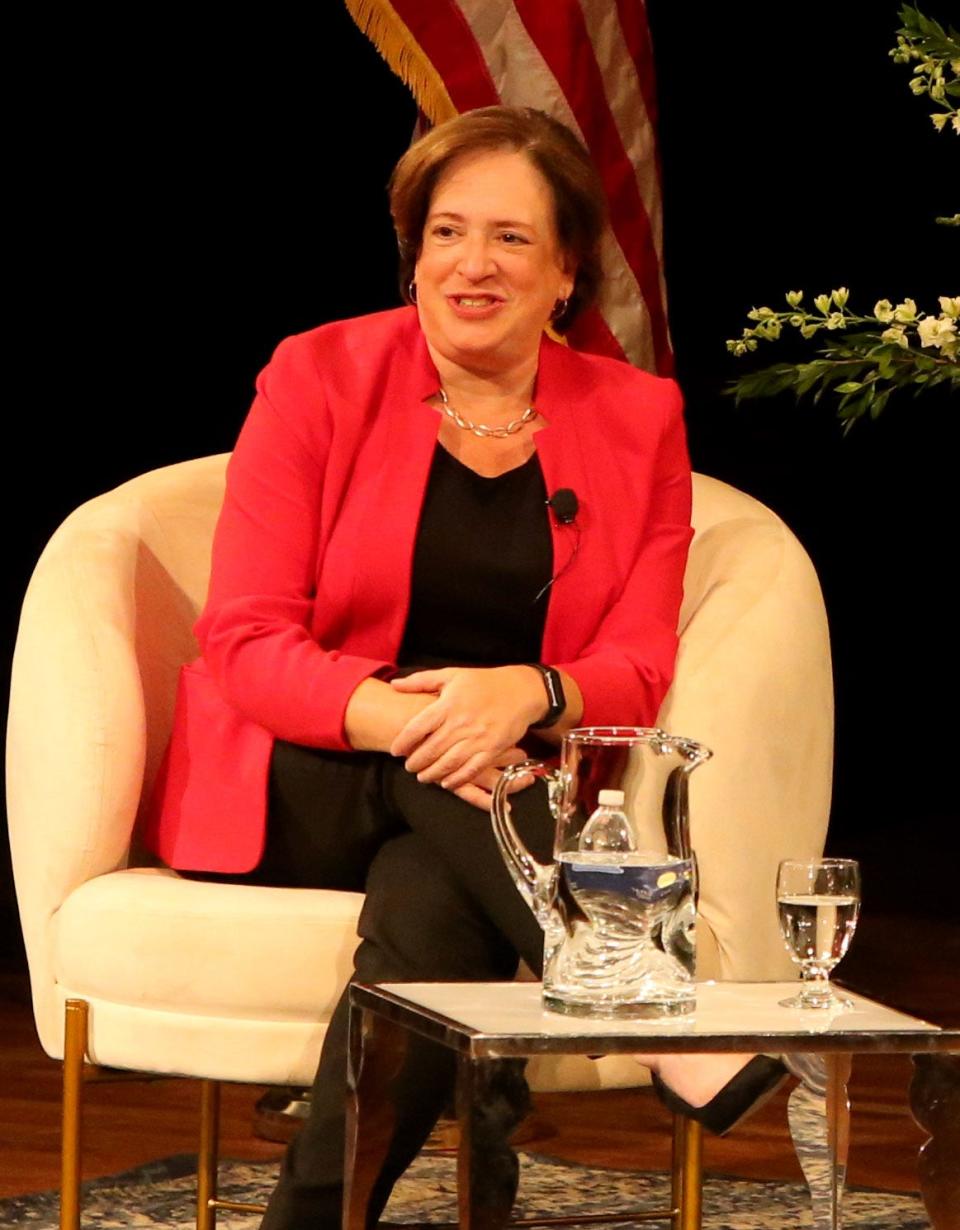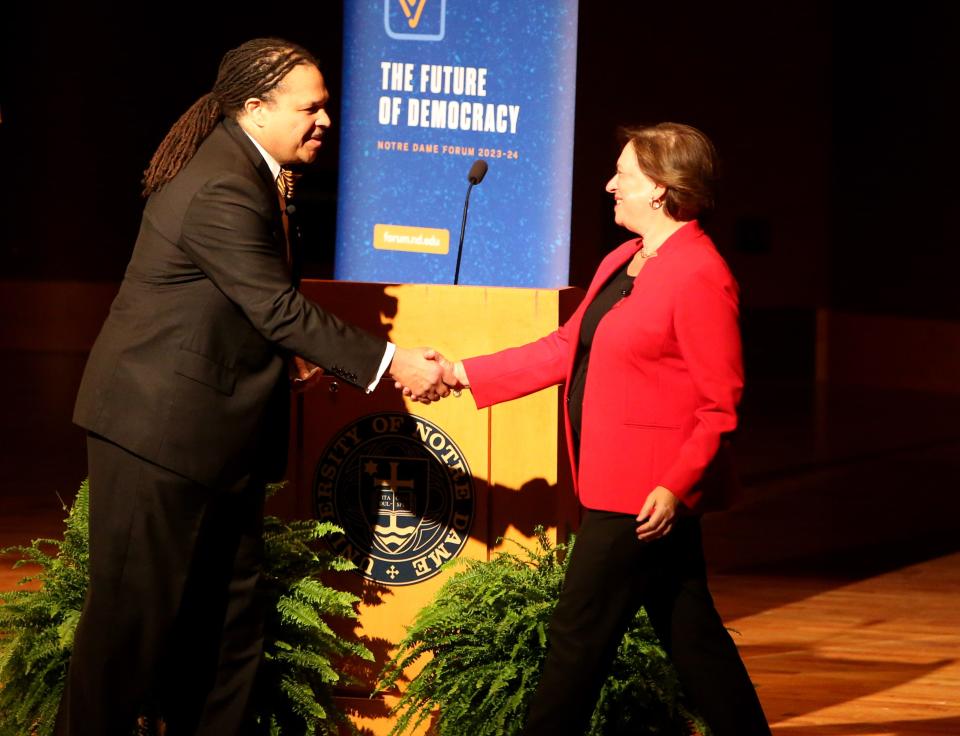Supreme Court Justice Kagan sheds light on court, evolution of democracy at Notre Dame talk

- Oops!Something went wrong.Please try again later.
- Oops!Something went wrong.Please try again later.
- Oops!Something went wrong.Please try again later.
- Oops!Something went wrong.Please try again later.
- Oops!Something went wrong.Please try again later.
SOUTH BEND — It is, in her mind, the most important dissent she’s written while on the U.S. Supreme Court. The justices ruled 5-4 in 2019 that partisan gerrymandering couldn’t be heard by the court, which left Justice Elena Kagan sad.
Kagan told an audience Friday at the University of Notre Dame that, “The lower courts have shown that really bad gerrymandering could be separated.”
“If there’s one thing the courts can do,” she said, speaking in the DeBartolo Performing Arts Center, “it is to protect the mechanisms of democracy itself.”
Kagan chatted in a Q&A format with Notre Dame Law School Dean G. Marcus Cole to start off a series of events, called Notre Dame Forum, that this year focuses on “The Future of Democracy” — from rising threats to how democracy can be reinvigorated.
2022 visit to ND: Amy Coney Barrett: Being in public eye as Supreme Court justice is 'a lot to get used to'
President Barack Obama nominated Kagan to the Supreme Court in 2010 to replace retiring Justice John Paul Stevens. She became the fourth woman on the court.
Before that, she’d served as the solicitor general of the United States since 2009, which she called “the coolest job in the world.”

The solicitor general decides what appeals to take to the Supreme Court and then argues them. For her, it was a brief but good introduction to the personalities of the other justices.
Cole asked her about a quote from her that has been oft repeated. In her nomination hearing, she'd said, “So in that sense, we are all originalists now.”
She explained that she had made that statement after a long discussion (not this one) about why she isn’t an originalist, which is someone who interprets constitutional law as it was meant at that point in history. She, instead, believes that the Constitution's meaning has evolved over time.
Watch on YouTube: Kagan's conversation at Notre Dame
“Trying to figure out what words meant to people (long ago) is a pretty impossible task,” she said, noting how one person’s review of history varies from another.
The Constitution’s framers, who’d just emerged from a revolution, “were speaking for the ages and they knew it,” she said. “If anyone understood how the world would change, these people did.”
The framers made many broad statements, rather than codifying specifics in the law, she noted. She pointed to the 14th Amendment and “equal protection of the laws,” which included formerly enslaved people, and as an example of how things have changed, said, “The two of us would not be up here having this discussion in 1868.”
That is, a white woman and a Black man.
She balanced her view by saying that the values of constraint, incrementalism, discipline and minimalism are also really important to the court.
As it is, she quipped about her old originalist quote, “That stupid sound bite has been held over my head for a while.”
Onstage: A liberal clerks for Scalia in 'The Originalist,' now at The Acting Ensemble in Mishawaka
Cole asked for examples of seldom-reported times when the justices agree.
Kagan said the nine agree unanimously on about 30% to 40% of the cases.
She recalled a decision that debated the “fair use” of an Andy Warhol image in a silk screen, which garnered an “enormous amount of press” because of its artistic curiosity.
Another case got attention because she and Sonia Sotomayor — normally in agreement — debated a case.
Many cases don’t get news coverage. But she said it doesn’t surprise her that people are talking most about the big-issue cases dealing with LGBTQ status, abortion and climate change that fall predictably along 6-3 decisions.
When Cole asked about the role of her faith, Kagan said she’s been a lifelong practicing Jew, religiously and culturally, but she tries to keep its morality separate from her decisions on the court.
Kagan is keen on good writing.
“I work hard to explain things,” she said of complex issues. “I want ordinary people to understand them.”

She’s also an avid reader.
On the airplane, she said, she was reading the book “Fever in the Heartland,” about the rise of the Ku Klux Klan in the 1920s, especially in Indiana. Kagan was at page 140 as she arrived in South Bend, she said, the very part where the book recalls when a group of Notre Dame students met a KKK group to counter-protest them as they arrived in town. A quarterback, coached at the time by Knute Rockne, threw stones to knock out the red balls on the Klan’s cross. The Klan left.
“Where’s that guy when you need him now?” Cole quipped.
As he closed the program, Cole said that the university had supplied her with “lots of green” to wear at Notre Dame’s football game Saturday against Ohio State.
“But not over the gift limit,” she added, noting ethics rules for the justices.
That presumably covered the sign that he then gave her, reading, “Rule like a champion today.”
Pro Publica brought the topic to the forefront earlier this year with its investigations into gifts received and not reported by Justices Clarence Thomas and Samuel Alito.
Kagan said it would be "a good thing" for the court to adopt a code of ethics.
She was the seventh of nine sitting Supreme Court justices who’ve spoken at Notre Dame in recent years. They’ve included former local resident and Notre Dame professor Amy Coney Barrett in February 2022, along with Alito, Brett Kavanaugh, John Roberts, Sonia Sotomayor, Thomas and Ruth Bader Ginsburg.
South Bend Tribune reporter Joseph Dits can be reached at 574-235-6158 or jdits@sbtinfo.com.
This article originally appeared on South Bend Tribune: Kagan at Notre Dame: Courts can 'protect the mechanisms of democracy'

